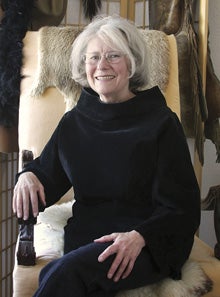Nancy Coggeshall ’63
 Gila Country Legend
Gila Country Legend
Writer Nancy Coggeshall grew up in what she calls the “demi-monde” of 1950s Narragansett where, as a teen-age waitress at a coffee shop she encountered the town’s colorful characters.
Years after leaving Rhode Island for London, Toronto, and Quebec, she discovered New Mexico, a world of open space and solitude with its own brand of colorful folks.
Instead of the fishermen and farmers of her youth, it was ranchers and cowboys. “They all live marginal lives,” she says. “That imperative breeds colorful people.”
A descendant of one of the founders of Rhode Island, Coggeshall majored in English and studied with Nancy Potter. She began a freelance magazine writing career in the early 1970s. Her affinity for New Mexico has led to her first book, a biography of the late New Mexico cowboy-rancher Quentin Hulse.
Gila Country Legend (University of New Mexico Press) has been named a notable book of the year by the Tucson-Pima County Library’s list for Southwest book lovers.
The book embodies the rugged history of southwestern New Mexico’s Gila County with its ancient peoples, Apache raids, Mexicans, ranchers, prospectors, and miners. Its contrasting mountains and forests, cliffs and hard ground, diamondbacks and coyotes seemed to vibrate with history, captivating her when she moved there in 1988.
By the time Coggeshall found Hulse, there was plenty of local lore surrounding him: He had reportedly met the outlaw Butch Cassidy, had witnessed a point-blank shooting at age 10, and was once shot himself. “Quentin was a great storyteller,” Coggeshall says. “I have tried to tell his story and Gila’s.”
It took her eight years of research and writing to complete the book she believes she was destined to write. “The connections between the Narragansett of my childhood and New Mexico are palpable,” says Coggeshall, who lives in a village over 250 miles from Albuquerque.
“Quentin carried the history; it was in his DNA. He had only an eleventh grade education, but he was one of the smartest men I ever met.”
—John Pantalone ’71
 Home
Home Browse
Browse Close
Close Events
Events Maps
Maps Email
Email Brightspace
Brightspace eCampus
eCampus


